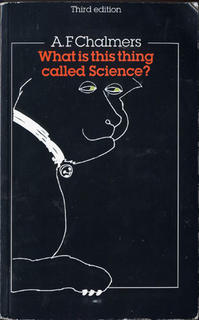a nice view of science

I’ve had it in the back of my mind to do a comprehensive review of What is this thing called science? by A F Chalmers, so as to try to get clear in my own head what science means to me and what I think of the positions Chalmers critiques (those of Lakatos, Popper and Feyerabend in particular). It’s already been some weeks since I read the book, and I feel a bit daunted by the task. Also, I haven’t had many clear spaces of time to get stuck into it.
The treatment by Catalyst the other day of the ‘Intelligent Design’ controversy – unsurprisingly, they pretty well endorse the view that ‘it’s not science’ – makes the question of what actually makes for science a little more urgent. Not that it’s up to me to provide the answer, but I must try to satisfy myself at least.
I first read What is this thing called science? in 1980, at a time when I was dabbling in philosophy far more frequently than I do now. It was a seminal book for me, making me an instant expert on the problem of induction, the flaws of falsificationism, and the dangers inherent in the relativism promoted in their different ways by Kuhn (the sociologists’ favourite) and Feyerabend. Having just reread it twenty-five years on (in its original edition, not the apparently expanded later edition shown here), I think I’ve gotten a lot more out of it this time around.
One not-very-flash reviewer has described the book as solid but uninspiring. Nothing could be further from the truth, and I think the book’s extraordinary sales testify to its impact on and interest for a great many individuals, as it’s not entirely an easy read - though it successfully avoids the abstruse. I can only really write of its appeal for me. For a start, it was a book that not only explained but tackled the major themes in philosophy of science. As another critic wrote, it’s very much a sceptic’s primer, so if you’re a combative type he provides plenty of material to use as ammunition.
The first chapters of the book deal with the inductive logic-type view of scientific understanding, a view which is still – and will perhaps always be – the popularly accepted view of how science works. Basically, this involves generalising from specifically observed ‘facts’ to create rules or scientific laws. Chalmers hammers home convincingly enough the theory-ladenness of our apparently innocent observations, which, together with the old problem of induction highlighted by Hume, renders naïve inductivism – well, just too naïve.
Chalmers then argues that a more sophisticated inductivist would wish to point out that, though it might be true that our observations only make sense as coming out of some more or less implied theory, there must be some sense in which the theory has been drawn from observation. At least, even if the theory is produced through some extraordinary intuition or stroke of genius, it must be supported and validated by observation. The difficulty here is obvious – that observations in turn depend upon theory and are never ‘innocent’.
Chalmers ‘finishes off’ inductivists by claiming that, though they may find ingenious ways to evade the criticisms directed at them from the perspective of the problem of induction and theory-dependence, their program is a degenerating one. Inductivism reached a dead end, more or less, with the logical positivists.
Chalmers next deals with the falsificationism of Karl Popper. This is a highly controversial area, with most current supporters of Popper’s ideas claiming that to call him a falsificationist misses the point, and subtlety, of his position. I’m not competent to wade into this matter, so I’ll deal here only with Chalmers’ characterisation of Popper’s views.
Science develops through a series of conjectures and refutations. Certainly all observations are theory-dependent, but there comes a time, with the growing technical sophistication of methods of observation and the accumulation of contradictory and confusing data, when current theory starts to feel the strain of observational pressure. New conjectures are required to account for the otherwise unaccountable. Almost of necessity these must be bold and imaginative, but once put forward they must be rigorously tested. They must withstand every effort to refute them.
However, such conjectures or hypotheses must be of such a nature that they can be refuted, or falsified. Examples of unfalsifiable statements include those that are necessarily true (by the definitions of terms), those that are all-inclusive (of the type ‘either x or not x’), and those (statements or hypotheses) that don’t carry any clear information, so that no statements clearly contradict them. Unsurprisingly, it’s this latter category that’s most controversially cited. With it, Popper tried to rule out the truth-claims of Marxists and astrologers, inter alia.


0 Comments:
Post a Comment
Subscribe to Post Comments [Atom]
<< Home